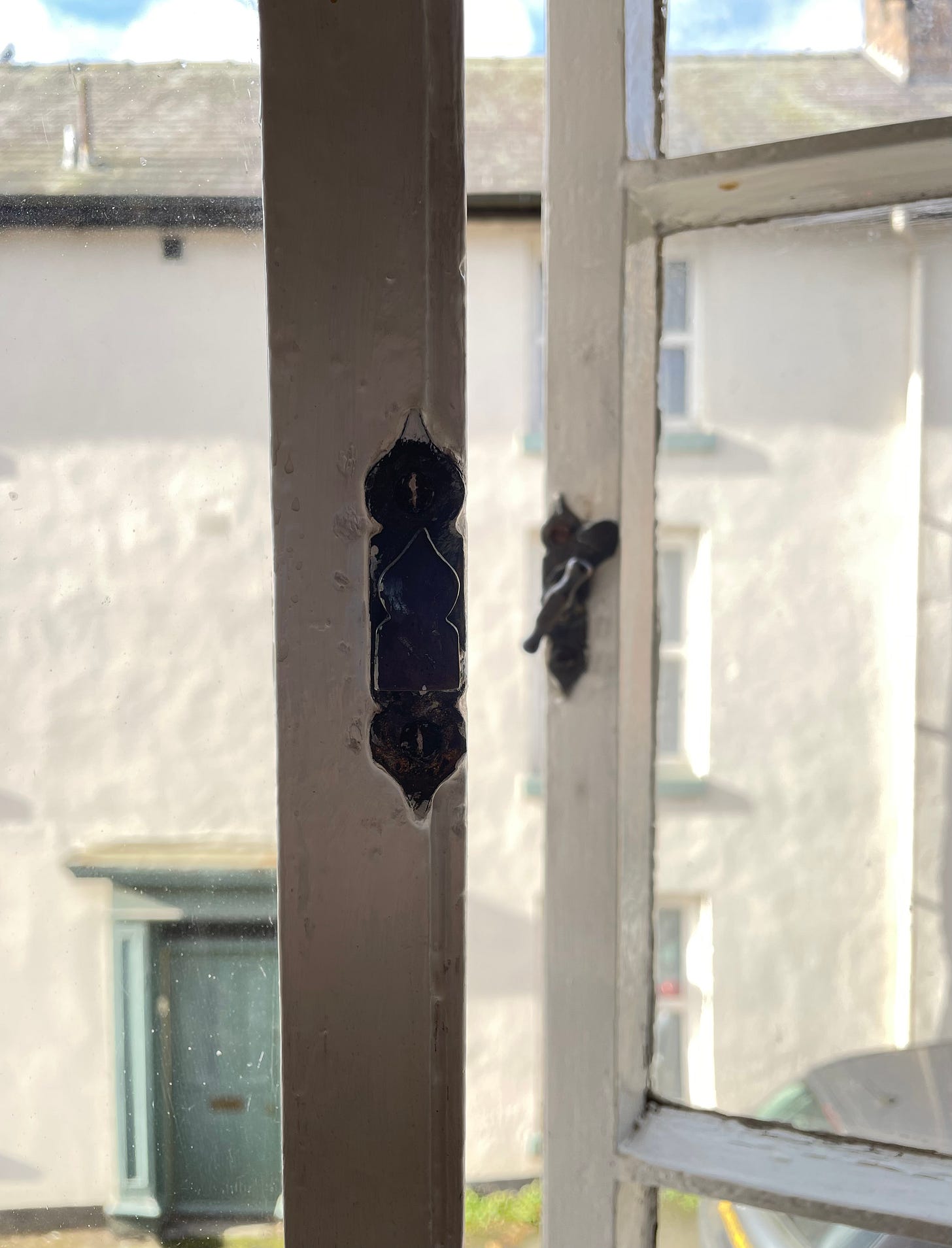It’s my sixth visit to my mother’s house since she died, and my last. We step from the pavement into the living room, breathe old woodsmoke and damp stone, dip our heads under the blackened, sloping beams to carry bags upstairs and make our beds, and what surprises me most is not that I can’t summon sadness when I want to, but how much I wish the kids were there.
‘I want to do it intentionally,’ I told my sister on the long drive west and north through Friday night traffic, ‘I don’t want to get into an unthinking rush.’ But there’s just so much to do.
We start in the eaves next morning. We lift pictures from their hooks, sweep the sags of dust behind them, roll rugs, dismantle drawers, unscrew mirrors. Every object entails a decision; tip, charity shop, leave or keep. We develop a code for speed and the piles on the ground floor grow.
The last time, the last time, the last time, plays in my head, as I trudge up and down the stairs, the carved, cool softness of the bannisters under my hand. The last time I will sleep here. The last time I’ll wake in the night and tiptoe to the loo, step over the creakiest boards, try not to knock the latch on the bathroom door, the last time I’ll pull the curtains in the morning and look at the sliver of sky and houses opposite.
We pile, we wrap, we pack. I fold the old clock in a bedspread and the escapement inside it ticks furiously, as if it’s having a heart attack. ‘I’d quite like to keep that,’ we say to each other, pretending to fight over the sticky, yellowed tupperware, and our laughter teeters on the edge of crying. We fill the van, shove moth-eaten blankets into the cloth bins at the local dump, lug more boxes of books into the secondhand shop than we know they want to take. As we undo Mum’s slow work of decorating and arranging, the house looks sadder, scrappier.
The crockery is the hardest. There’s one salad bowl that's just too painful to keep. Our jokes get weaker, and then we stop and cry, sitting in the dust on the kitchen floor. How can it be that this green oven dish, this patterned plate we ate toast from as children, are the end point, the distillation of two people, their marriage, three houses, four childhoods, two deaths?
‘I think we can squeeze in a walk,’ my sister says. It’s a relief to leave. We drive to the nearest place Mum loved, carrying smooth, grey stones she’d collected and lined up on the kitchen window sill, and on our way round the overgrown site of an iron age fort, in the dazzling, low September sun, we place one every few minutes, nestling it into the bracken. I think of their roundness in her hands. Her absence is vivid.
There is peace in the wind, roaming across the hilltop. In its movement in the trees, in the ticking, rustling music of the dried seed heads and grasses. I look out at the pattern of green and brown in the hills below us, and at the highest point we lie on the ground. Let yourself be held by gravity, Mum said at the end of her classes, as we rested in shavasana. There is so much to be glad for, I make myself think.
On Sunday morning we pack the last few things and begin to clean, not talking now. I go into each room, say quietly, goodbye, and I say it for Mum, because she couldn’t. My sister locks the door and I watch as she pushes the keys through the letterbox. We drive away on the dot of eleven, the town hall bell tolling in the drizzle, and I wish again that the kids were there to say goodbye to this place, this unexpected bonus to their childhoods, this stand in for a grandmother.
‘It’s strange to think that house was in our family the longest,’ I say on the motorway. Twenty two years, longer than our childhood home. A car glides past us in the fast lane, its number plate ending in MUM, and a few minutes later we overtake a car with a plate ending in DAD. Everything feels too real, and my eyes are dry and prickly, my shoulders rigid.
We swap the driving at a service station, then swap back on the hard shoulder after a panic attack. ‘I don’t think we realise,’ I say, glancing across at my sister, my whole self thankful for her companionship, ‘we're so used to dealing with stuff endlessly, we just plough on, don’t really acknowledge how big it is, what a full stop.’
But the house is still ours, hovering at the backs of our minds, until the following Friday, when with an invisible snip made by a bank transfer the bonds of my siblings’ and my shared responsibility are finally cut. I have a bottle of something, but I don’t want to drink it. I wash the tablecloths and cushion covers I’ve brought back, dust the pictures, tip the clock on its side to stop it hammering. I sit in the late afternoon sun in the garden, exhausted, and wonder what it will feel like, when the bonds loosen and fall away.






Not looking forward to this part, especially since Mom's last years are being spent in my home, so I can't really close anything up and leave it behind. Unless I sell. Lovely to read this. Thanks for sharing
I'm reading this while I'm waiting to collect my car from the mechanic. How am I going to explain my moist eyes? Thank you for such a beautiful piece of writing. I will never forget waiting for the Salvation Army truck to come and collect the umpteen bags of clothes, family furniture, endless piles of records after packing up my oarents' house.